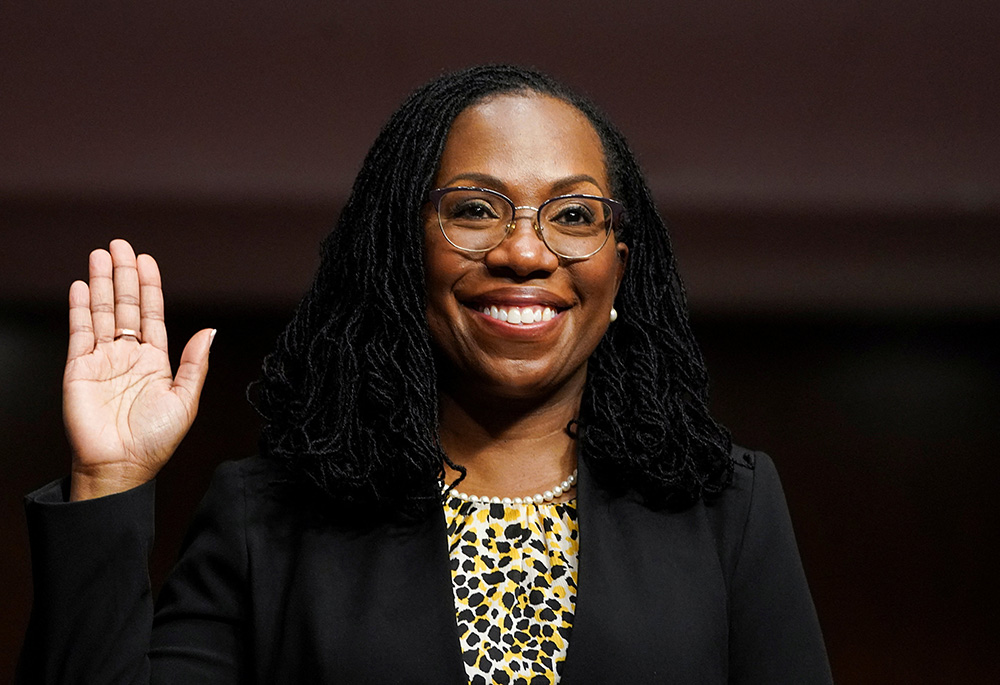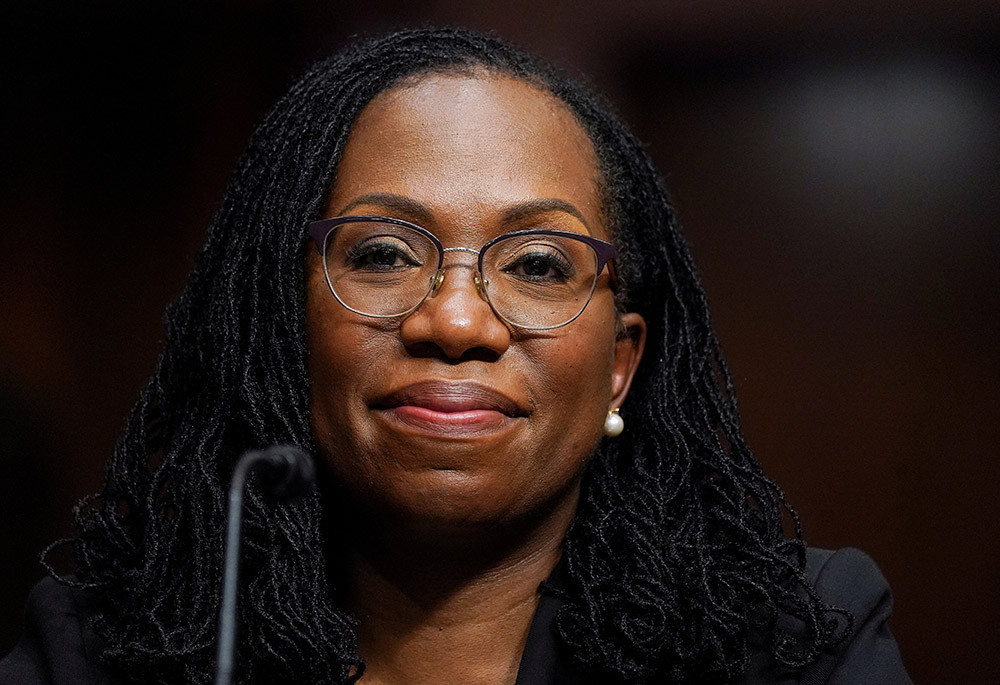
President Joe Biden nominated Ketanji Brown Jackson, pictured April 28, 2021, in Washington, to the U.S. Supreme Court Feb. 25. If confirmed, she would become the first Black woman to serve as a justice. (CNS/Reuters/Kevin Lamarque)
President Joe Biden announced Feb. 25 at the White House that he has chosen a "proven consensus builder" by nominating Judge Ketanji Brown Jackson, a federal appeals court judge, to serve on the Supreme Court.
If confirmed, she will be the first Black woman on the nation's high court.
Jackson, who was introduced by the president, said she was "truly humbled by the extraordinary honor of this nomination" and thanked God for bringing her to this point in her professional journey, adding: "One can only come this far by faith."
She said she hoped her love of this country and the Constitution would inspire future generations of Americans and also gave a shoutout to Justice Stephen Breyer, whose spot on the bench she will fill if she is confirmed by the U.S. Senate.
Jackson clerked for Breyer in the 1999-2000 court term and said he demonstrated how a Supreme Court justice can demonstrate civility, grace and generosity of spirit.
Jackson, 51, had been considered a front-runner to replace Breyer since he announced in late January his plans to retire at the end of the court's current term. She worked with law firm and served as a federal public defender before President Barack Obama nominated her in 2012 to serve as a district court judge where she served for more than eight years.
Last year, Biden named her to the U.S. Court of Appeals for the District of Columbia Circuit and the Senate confirmed her with a 53-44 vote.
Jackson was born in Washington and grew up in Miami. She is a graduate of Harvard College and Harvard Law School in Cambridge, Massachusetts.

Ketanji Brown Jackson, pictured April 28, 2021, in Washington (CNS/Reuters/Kevin Lamarque)
Court watchers have been quick to point out that although her appointment would be historic, her spot on the bench will not change the court's current balance of liberal and conservative justices.
Pro-life advocates were not happy with her nomination. Marjorie Dannenfelser, president of the Susan B. Anthony List, said in a Feb. 25 statement that Biden "is fulfilling his promise to only appoint justices who support Roe v. Wade," noting that Jackson is "on record opposing the free speech rights of pro-life advocates pleading to save lives outside abortion centers."
Dannenfelser was referring to an amicus brief that Jackson's law firm in Boston submitted in 2001 supporting a Massachusetts law that created a buffer zone around pedestrians and cars approaching abortion clinics. The firm's clients included the Abortion Access Project of Massachusetts and NARAL Pro-Choice America.
Similarly, Kristan Hawkins, president of Students for Life Action, pledged that young people in the pro-life movement would be "actively opposing" this nomination, noting that Jackson clerked for Breyer when he wrote the opinion striking down a Nebraska law banning partial-birth abortions.
As a federal District Court judge, Jackson handled a number of challenges to executive agency actions that raised questions of administrative law.
One case that gained political attention was her 2019 ruling that a former White House counsel to President Donald Trump had to obey a congressional subpoena seeking his testimony over Trump's efforts to obstruct the investigation of possible Russian interference in the 2016 presidential election.
During her confirmation hearing for the federal court of appeals last year, Jackson was asked about her involvement from 2010 to 2011 on the board of Montrose Christian School, a Maryland private school that has since closed.
Sen. Josh Hawley, R-Mo., said the school's statement of faith indicated the school "should speak on behalf of the unborn," defend the sanctity of all human life from conception to natural death" and promote that marriage should be limited to a man and a woman.
Hawley said Supreme Court Justice Amy Coney Barrett was criticized for serving on the board of a Christian school with similar positions and that he had "defended her at the time." He asked Jackson if her school board involvement meant she believed in "the principle and the constitutional right of religious liberty."
"I do believe in religious liberty," Jackson replied, calling it a "foundational tenet of our entire government." She also distanced herself from the school's statement of faith by saying she has served on many boards and did not necessarily agree with all of the statements they might have in their materials and that in this case she was not aware of the school's statement of beliefs.
Advertisement
Jackson met her husband, Patrick, a surgeon at MedStar Georgetown University Hospital, while both were students at Harvard. The couple married in 1996 and have two daughters.
During Jackson's 2012 confirmation hearing, Sen. Mike Lee, R-Utah, asked if as a District Court judge she planned "to follow Justice Breyer's very awesome style of questioning." She said she did not think she could match Breyer's style and she didn't know if she would "even attempt to try."
Ahead of news reports announcing that Jackson was Biden's nominee pick, a joint statement from the Catholic social justice lobby Network, the National Black Sisters Conference and the Leadership Conference of Women Religious said they "strongly support the Biden administration's promise to nominate a Black woman to the United States Supreme Court."
The three Catholic groups said it is "imperative that the court reflect the diversity of our country in order to act in a fully informed, deliberate way and arrive at sound decisions."
"In light of the renewed attacks on voting rights and racial progress we see today, it is even more critical to nominate a justice who is committed to upholding the rule of law and the Constitution for this generation and the generations to come," the statement said.
In a Feb. 23 statement, the three organizations applauded the three women most often cited as potential court nominees — Jackson, Justice Leondra Kruger and Judge J. Michelle Childs. They said each were highly qualified to serve on the Supreme Court because of their background and judicial record.
The Catholic groups also said they "vigorously reject the comments of those who have already questioned the future nominee's qualifications as racist and sexist," after some criticized Biden for promising to only consider Black women to nominate to the court.
Jackson will next appear before the Senate Judiciary Committee, and once her nomination is processed by that committee, she will need 51 Senate votes to be confirmed.
The nominee has not indicated a religious affiliation.
Currently the court has six Catholic justices: Chief Justice John Roberts and Justices Brett Kavanaugh, Clarence Thomas, Samuel Alito, Sonia Sotomayor and Amy Coney Barrett. Justice Neil Gorsuch was raised Catholic but is now Episcopalian. Justices Breyer and Elena Kagan are Jewish.




